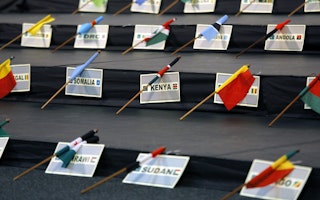A Victory for Equal Education in South Africa
By Jonathon Fairhead
“Education,” Nelson Mandela said, “is the most powerful weapon which you can use to change the world.”
As South Africa celebrates the legacy of Mandela it also marks the most significant advance for the children of South Africa since the end of apartheid. During apartheid the government deliberately stunted access to quality education for the country’s black majority and passed a legacy of grossly unequal schools to the first democratic government there. State schools could be made of mud and collapse in the rain, be built on lush campuses with state of the art classrooms, or have no windows, desks or toilets.
While the Africa National Congress (ANC) government did much to equalize teacher pay and improve conditions in schools, the physical landscape of schooling in South Africa looks much the same today as it did 20 years ago. This is about to change. In November 2013, Minister of Basic Education Angie Mosthekga announced legally binding norms and standards for all schools in South Africa.
Equal Education is a membership-based grassroots organization made up of learners, parents, teachers, policy analysts and activists working for equality and quality in South African schools. Members have done much to improve school conditions in South Africa but were continuously frustrated in their attempts to demand improved school infrastructure.
There was no binding concept of what made a school a school and therefore no way to hold the government accountable for infrastructure. This despite the fact that the Minister of Basic Education, Angie Motshekga, had the legal power to set minimum norms and standards for school infrastructure and had been called on to do so again and again.
The fight for norms and standards galvanized Equal Education and South African civil society under the banner “Every Generation Has Its Struggle.” Capitalizing on much of the tradition and momentum of the anti-apartheid struggle the campaign sought to bring South Africa closer to the promises of the ANC Freedom Charter which states: "Education shall be free, compulsory, universal and equal for all children."
For years, thousands of schoolgoers have learned about legally binding norms and standards for school infrastructure at Equal Education’s weekly youth meetings, and at the annual empowerment camps they organize. These young people at the forefront of education change in South Africa call themselves the Equalizers. They have marched, petitioned, fasted, and slept outside parliament again and again over the last four years.
When forced by the Minister’s repeated failed promises, Equal Education instigated legal action on their behalf and worked with South Africa’s Legal Resources Center to build a case for legally binding norms and standards. The South African constitution enshrines a basic education as an immediately realizable constitutional right but the question remained: How could South Africans realize that right without codified norms and standards? How could they hold government to account without these benchmarks? Equal Education also established the Equal Education Law Center, South Africa’s first public interest law firm focusing solely on education to support the campaign for minimum norms and standards.
Strategic litigation back up a by an informed public and a robust movement of activists proved a potent tool as the movement continued to pressure the Minister of Basic Education through several rounds of negotiations. Equal Education put two previous drafts of the Norms and Standards bill to public comment thereby ensuring the voices of South Africans reached their governments ears.
These initial drafts were deemed by Equal Education and South Africans to be inadequate. The case moved through the courts until finally on November 29, 2013, Minister of Basic Education Angie Mosthekga announced legally binding norms and standards for all schools in South Africa.
Schools in South Africa will now have to have electricity, running water, and adequate classrooms with caps on the amount of students per classroom. They will have to have access to libraries. They will need to have laboratories if they offer science. All schools will need to have access to playing fields for recreational activities. Schools will need to be safe and secure and will need to have adequate communication devices including internet. The bill stipulates that these improvements will need to occur within the next seven to ten years.
Parents and learners who find their schools in inadequate condition will be able to hold their local municipal and provincial governments to account because the law will be on their side. Another struggle in the long battle to end the legacy of apartheid has been won.
Until September 2014, Jonathon Fairhead was a program assistant with the Education Support Program.


